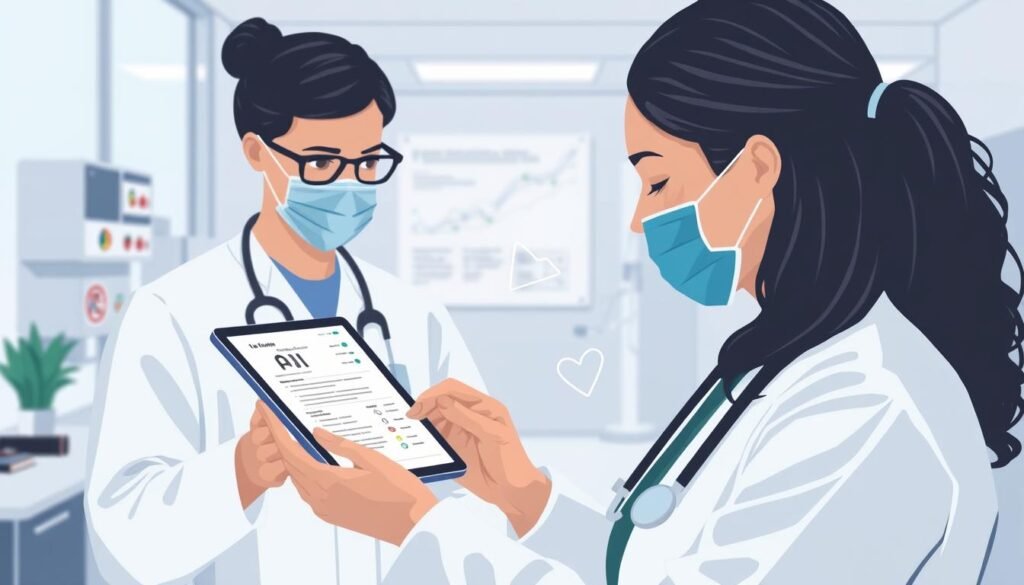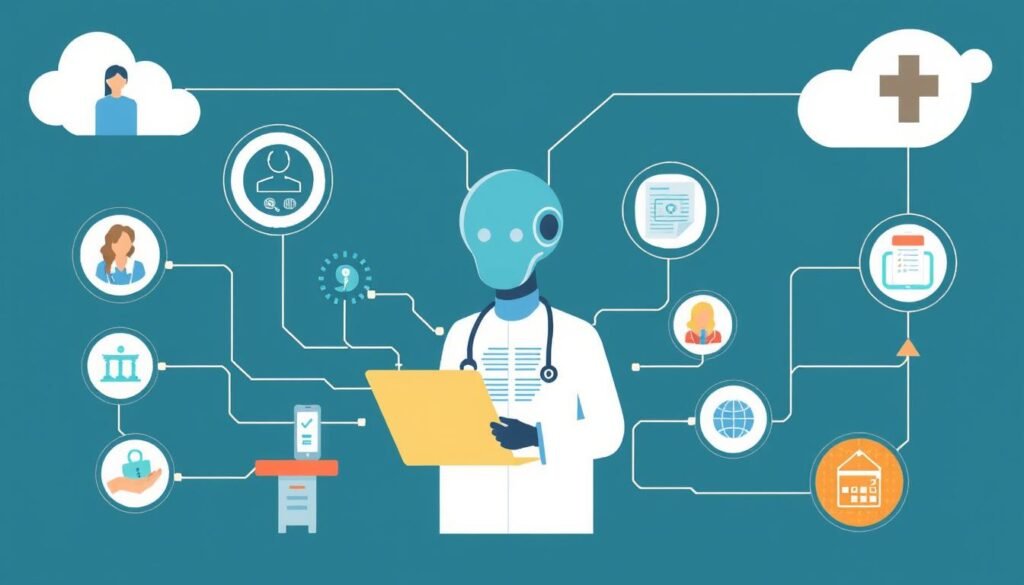Can AI Help Reduce Clinician Burnout?
The World Health Organization classifies burnout as an ‘occupational phenomenon’, resulting from chronic workplace stress. It affects physicians, nurses, and healthcare staff, impairing the healthcare workforce.
Studies show a significant percentage of physicians and healthcare professionals report symptoms of burnout. The rapid evolution of artificial intelligence in health care presents an opportunity to address burnout and workforce shortages.
By streamlining workflows and reducing administrative burden, AI technologies can allow clinicians to focus more on patient care, improving efficiency and saving time. This article explores how AI solutions can alleviate the root causes of burnout.
Key Takeaways
- AI can help reduce administrative tasks for healthcare professionals.
- Streamlining workflows can improve efficiency in healthcare settings.
- Clinicians can focus more on patient care with AI assistance.
- AI technologies have the potential to alleviate clinician burnout.
- Implementing AI tools can lead to better healthcare outcomes.
Understanding the Crisis of Clinician Burnout
Clinician burnout has emerged as a critical issue in healthcare, affecting both professionals and patient care. The current healthcare landscape, characterized by the widespread adoption of electronic health records (EHRs) and heightened regulatory demands, has significantly contributed to this crisis.
Defining Burnout in Healthcare Settings
Burnout in healthcare settings refers to a state of emotional, mental, and physical exhaustion caused by prolonged stress, overwork, and lack of balance in life. It is characterized by a diminished ability to perform tasks effectively and a loss of interest in work.
The Scale and Impact of Clinician Burnout
The scale of clinician burnout is substantial, with studies indicating that a significant proportion of healthcare professionals experience burnout. The impact is far-reaching, affecting not only the well-being of clinicians but also the quality of patient care and the overall efficiency of healthcare systems.
| Aspect | Impact of Burnout |
|---|---|
| Patient Care | Reduced quality, increased medical errors |
| Clinician Well-being | Emotional exhaustion, decreased job satisfaction |
| Healthcare Systems | Increased costs, reduced efficiency |
Primary Causes of Burnout Among Healthcare Professionals
The primary causes of burnout include the administrative burden associated with EHRs, documentation requirements, and regulatory compliance. Other factors are time pressure, lack of autonomy, and the cognitive load of integrating fragmented healthcare information.

The factors contributing to burnout are complex and multifaceted. Key among them are:
- Increased time spent on EHR tasks and administrative responsibilities.
- Fragmentation of healthcare information and the resultant cognitive load.
- Time pressure and productivity expectations.
- Loss of autonomy and control over work schedules and practice decisions.
How AI Can Address the Root Causes of Clinician Burnout
By leveraging AI, healthcare providers can significantly reduce the administrative and cognitive burdens that contribute to burnout. This section will explore how AI can address the root causes of clinician burnout.
Reducing Administrative Burden Through Automation
AI can automate many administrative tasks that consume a clinician’s time. Automated systems can handle tasks such as data entry, patient scheduling, and billing, freeing up clinicians to focus on patient care.
- AI-powered tools can optimize clinical workflows by identifying bottlenecks and suggesting improvements.
- Intelligent scheduling systems balance patient appointments based on complexity and provider availability.
Alleviating Cognitive Overload with Smart Systems
Clinicians often face cognitive overload due to the vast amounts of data they must process. AI-powered predictive analytics can help by forecasting patient deteriorations and improving hospital operations. Studies have shown that AI can decrease in-hospital mortality by enabling early recognition and transfer of critical patients to intensive care units.
- AI can anticipate patient needs and streamline clinical decision-making.
- Smart systems can provide real-time support, reducing the cognitive load on clinicians.
Improving Workflow Efficiency and Time Management
AI can optimize clinical workflows, improving efficiency and reducing frustration. By analyzing workflow patterns, AI can identify areas for improvement and suggest optimizations.

Effective use of AI tools can lead to better time management, allowing clinicians to prioritize tasks more effectively and manage their workload. This results in reduced stress and improved job satisfaction.
AI-Powered Documentation Solutions

With the advent of AI in medical documentation, the potential to alleviate clinician burnout is becoming increasingly evident. AI-powered documentation solutions are designed to reduce the administrative burden on healthcare professionals, thereby improving the overall efficiency of healthcare services.
Digital Scribes and Automated Note-Taking
Digital scribes and automated note-taking systems are revolutionizing the way clinicians document patient information. By leveraging AI, these systems can accurately capture and record patient data during clinical encounters, reducing the need for manual entry into electronic health records. This not only saves time but also allows physicians to focus more on patient care.
Voice Recognition and Transcription Technologies
Voice recognition and transcription technologies are another crucial aspect of AI-powered documentation. These technologies enable clinicians to dictate notes, which are then transcribed into the patient’s electronic health record. This process enhances documentation efficiency and reduces the likelihood of errors associated with manual data entry.
Measuring the Impact on Documentation Time
Studies have shown that AI documentation tools can save physicians between 30-120 minutes per day, significantly reducing the administrative burden. The impact of this saved time is multifaceted, allowing for more focus on patient care, professional development, or personal well-being, all of which are critical in combating burnout. Furthermore, research indicates that the quality of documentation improves with AI assistance, with more comprehensive notes and fewer errors.
The integration of AI in documentation is not only improving the efficiency of healthcare services but also enhancing the overall quality of health care by ensuring that records are accurate and up-to-date. As the healthcare industry continues to adopt these technologies, it is likely that the impact on clinician burnout will become more pronounced, leading to a healthier and more sustainable healthcare workforce.
Streamlining Administrative Tasks with AI
AI is transforming healthcare by streamlining administrative tasks, reducing clinician burnout. By leveraging AI healthcare administrative solutions, healthcare providers can optimize their workflow, improve efficiency, and enhance patient care.

Automated Billing and Coding Systems
Automated billing and coding systems utilize AI to reduce errors and increase the speed of the billing process. These systems can automatically code diagnoses and procedures, ensuring compliance with the latest coding standards. By minimizing manual entry, they reduce the likelihood of errors, thus improving the overall management of healthcare finances.
AI-Enhanced Inbox Management
AI-enhanced inbox management helps clinicians manage the high volume of messages they receive daily. By using AI algorithms to prioritize and categorize messages, these systems ensure that critical information is addressed promptly. This not only improves response times but also reduces the cognitive load on clinicians, allowing them to focus more on patient care.
Scheduling and Resource Optimization
AI-driven scheduling systems can optimize appointment times based on patient needs, provider availability, and resource requirements. These systems can predict no-shows and cancellations, enabling proactive overbooking or rescheduling. By allocating staff and resources more efficiently, AI improves the overall workflow and reduces wait times, enhancing the healthcare experience for patients.
Can AI Help Reduce Clinician Burnout Through Clinical Decision Support?
AI-driven clinical decision support systems are emerging as a crucial tool in mitigating the factors that contribute to clinician burnout. By enhancing the quality of patient care and streamlining clinical workflows, these systems can significantly reduce the administrative and cognitive burdens on healthcare professionals.
Information Synthesis and Patient Data Summarization
One of the key benefits of AI in clinical decision support is its ability to synthesize vast amounts of data and summarize patient information effectively. This capability allows clinicians to quickly access relevant patient information, making it easier to make informed decisions.

Diagnostic Support and Pattern Recognition
AI systems can analyze complex health data to identify patterns that may elude human clinicians. By providing diagnostic support, these systems can help reduce the cognitive overload associated with diagnosing complex conditions, thereby alleviating some of the pressures that contribute to burnout.
| Benefits of AI in Clinical Decision Support | Description | Impact on Clinician Burnout |
|---|---|---|
| Information Synthesis | Summarizes patient data and relevant information | Reduces time spent reviewing patient data |
| Diagnostic Support | Analyzes complex health data for pattern recognition | Decreases cognitive overload in diagnosis |
| Predictive Analytics | Forecasts patient deteriorations and potential complications | Enables proactive care, reducing emergency interventions |
Predictive Analytics for Patient Care
Predictive analytics powered by artificial intelligence can forecast patient deteriorations, allowing for proactive interventions. Studies, such as those by Winslow et al., have shown that machine learning models can decrease in-hospital mortality by enabling early recognition and transfer of patients to intensive care units. By anticipating and mitigating potential health issues before they escalate, clinicians can reduce the stress associated with emergency interventions, thereby improving both patient care and clinician well-being.
The integration of AI in clinical decision support not only enhances the quality of care but also has a positive impact on reducing clinician burnout. By leveraging these technologies, healthcare organizations can create a more sustainable and supportive environment for their clinicians.
Implementing AI Solutions in Healthcare Settings
To effectively reduce clinician burnout, healthcare practices must carefully implement AI solutions. This involves understanding the specific needs of their practice and selecting the right tools to address those needs.
Assessing Your Practice’s Needs and Pain Points
The first step in implementing AI solutions is to assess the specific challenges faced by your healthcare practice. This involves identifying areas where clinicians are experiencing the most significant burden, whether it’s in documentation, administrative tasks, or clinical decision-making. By understanding these pain points, practices can focus on implementing AI tools that directly address these issues.
Selecting the Right AI Tools for Your Team
With a clear understanding of their needs, healthcare practices can then select AI tools that are tailored to their specific requirements. This might involve choosing tools that automate administrative tasks, enhance clinical decision support, or improve documentation efficiency. Successful AI implementation requires a deep understanding of physician practices and their unique challenges.
Change Management and Staff Training
Effective implementation of AI solutions also requires robust change management strategies and comprehensive staff training. This includes clear communication about the benefits of AI tools, tailored training programs for different user groups, and ongoing support to ensure a smooth transition. Key strategies for successful adoption include:
- Clear communication about the personal benefits of AI tools for clinicians
- Comprehensive training programs tailored to different user groups and learning styles
- Protected time for training and adaptation to avoid exacerbating burnout
- Identifying and supporting “physician champions” to demonstrate the value of AI tools
By following these strategies, healthcare practices can ensure that AI solutions are implemented effectively, reducing clinician burnout and improving overall care.
Addressing Challenges and Concerns with AI Adoption
Adopting AI in healthcare raises several critical concerns that need to be addressed proactively. While AI has the potential to alleviate clinician burnout, its integration into healthcare systems is not without challenges.
Ensuring Physician Input in AI Development
It is crucial to ensure that physicians are involved in the development and refinement of AI tools. Their input can help tailor AI solutions to meet the specific needs of healthcare providers, enhancing the usability and effectiveness of these systems. Physician involvement can also help mitigate potential biases in AI algorithms.
Maintaining Clinical Skills in an AI-Enhanced Environment
The reliance on AI could potentially diminish clinical skills if not managed properly. Continuous training and hands-on experience are essential for maintaining proficiency. Healthcare organizations should implement strategies to ensure that clinicians continue to develop and refine their skills even as they utilize AI tools.
Data Privacy and Security Considerations
The use of AI in healthcare raises significant concerns about data privacy and security. Ensuring compliance with regulations such as HIPAA is paramount. Healthcare organizations must establish clear policies regarding data access, storage, and sharing.
| Challenge | Mitigation Strategy |
|---|---|
| Data Privacy Concerns | Compliance with HIPAA, robust security measures |
| Potential Bias in AI | Physician input in AI development |
| Diminishing Clinical Skills | Continuous training and hands-on experience |
By addressing these challenges proactively, healthcare organizations can harness the benefits of AI while minimizing its risks.
Conclusion: The Future of AI in Reducing Clinician Burnout
AI is poised to play a critical role in addressing the root causes of clinician burnout, from reducing administrative burdens to supporting clinical decision-making. By leveraging artificial intelligence technologies, healthcare organizations can create a more sustainable and fulfilling environment for clinicians, ultimately improving patient care.
The future of healthcare likely involves a collaborative partnership between human clinicians and AI tools, with each contributing their unique strengths to improve outcomes. As AI continues to evolve, we can expect more sophisticated tools that adapt to individual clinician preferences and practice patterns.
By thoughtfully implementing AI solutions with clinician well-being as a primary consideration, healthcare organizations can create more sustainable practice environments that benefit providers, patients, and the healthcare system as a whole. This collaborative approach can help restore a sense of purpose and fulfillment among healthcare workers, reinforcing their essential role as caregivers.
FAQ
How does AI-powered documentation impact physician workflow?
AI-powered documentation solutions, such as digital scribes and automated note-taking, can significantly streamline physician workflow by reducing the time spent on administrative tasks, allowing healthcare professionals to focus on patient care.
What are the benefits of using AI-enhanced inbox management for healthcare providers?
AI-enhanced inbox management can help healthcare providers efficiently manage their electronic health records (EHRs) inbox, prioritize tasks, and reduce the burden of unnecessary emails, thereby improving overall workflow efficiency.
How can AI-driven clinical decision support systems improve patient care?
AI-driven clinical decision support systems can synthesize patient data, provide diagnostic support, and offer predictive analytics, enabling healthcare professionals to make informed decisions and improve patient outcomes.
What are the key considerations for implementing AI solutions in healthcare settings?
When implementing AI solutions, healthcare organizations should assess their practice’s needs, select the right AI tools, and provide adequate staff training to ensure successful integration and minimize disruption to existing workflows.
How can healthcare organizations address concerns around data privacy and security when adopting AI technologies?
Healthcare organizations should prioritize data privacy and security by ensuring that AI solutions are designed with robust security measures, complying with relevant regulations, and maintaining transparency around data usage and storage.
What role does physician input play in the development of AI solutions for healthcare?
Physician input is crucial in the development of AI solutions, as it ensures that the tools are clinically relevant, effective, and meet the needs of healthcare professionals, ultimately improving patient care and reducing clinician burden.
Share this content:




Post Comment